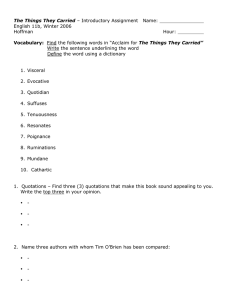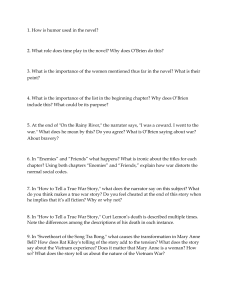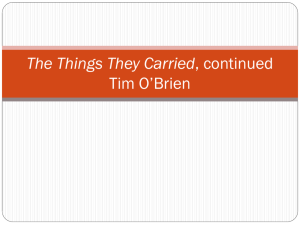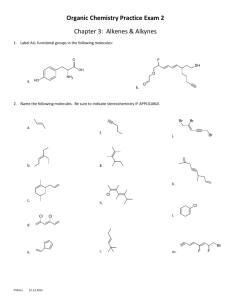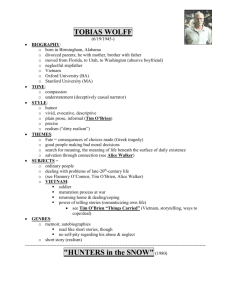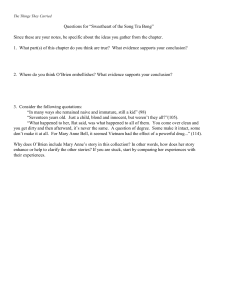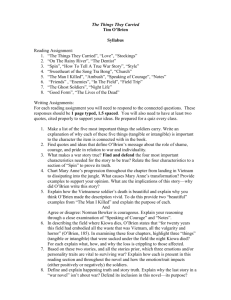TEACHING O’BRIEN Professor R.D. Madison United States Naval Academy
advertisement
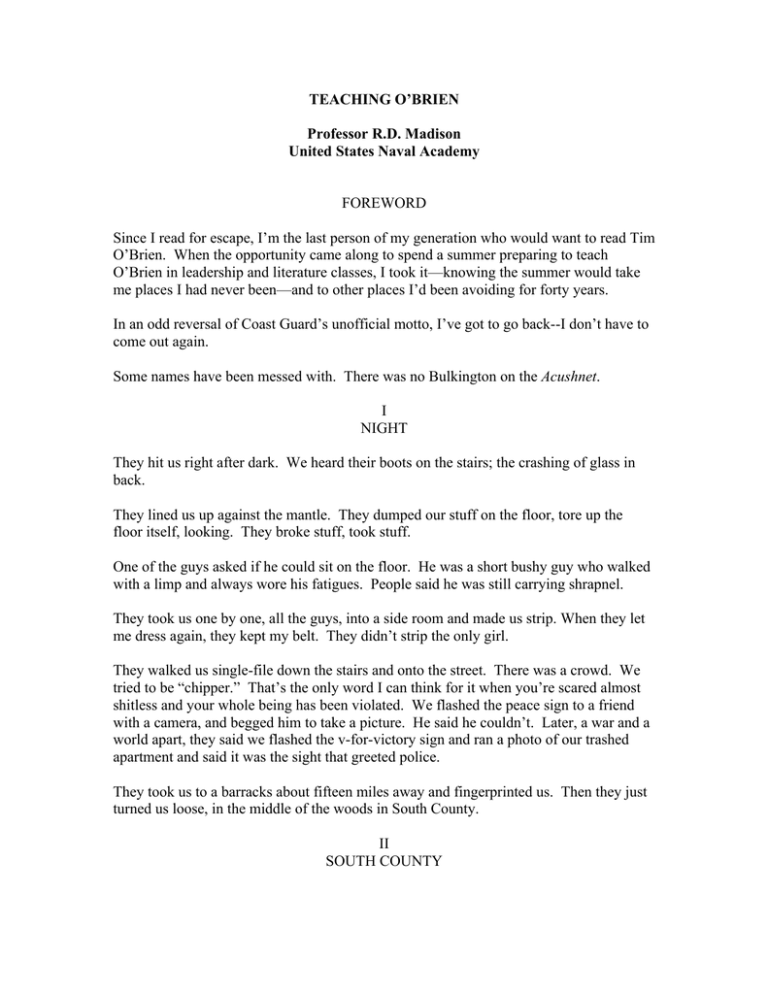
TEACHING O’BRIEN Professor R.D. Madison United States Naval Academy FOREWORD Since I read for escape, I’m the last person of my generation who would want to read Tim O’Brien. When the opportunity came along to spend a summer preparing to teach O’Brien in leadership and literature classes, I took it—knowing the summer would take me places I had never been—and to other places I’d been avoiding for forty years. In an odd reversal of Coast Guard’s unofficial motto, I’ve got to go back--I don’t have to come out again. Some names have been messed with. There was no Bulkington on the Acushnet. I NIGHT They hit us right after dark. We heard their boots on the stairs; the crashing of glass in back. They lined us up against the mantle. They dumped our stuff on the floor, tore up the floor itself, looking. They broke stuff, took stuff. One of the guys asked if he could sit on the floor. He was a short bushy guy who walked with a limp and always wore his fatigues. People said he was still carrying shrapnel. They took us one by one, all the guys, into a side room and made us strip. When they let me dress again, they kept my belt. They didn’t strip the only girl. They walked us single-file down the stairs and onto the street. There was a crowd. We tried to be “chipper.” That’s the only word I can think for it when you’re scared almost shitless and your whole being has been violated. We flashed the peace sign to a friend with a camera, and begged him to take a picture. He said he couldn’t. Later, a war and a world apart, they said we flashed the v-for-victory sign and ran a photo of our trashed apartment and said it was the sight that greeted police. They took us to a barracks about fifteen miles away and fingerprinted us. Then they just turned us loose, in the middle of the woods in South County. II SOUTH COUNTY I was born in the first half of the last century. We lived about four miles out of town in post-war suburbia, where all the veterans were now, elevated out of the Depression by the war, raising their lower-middle-class families. My mother’s father was a subsistence farmer who worked for the highway department in the summer to earn money to pay the taxes. Even after the war his house had no electricity or running water, and when he strode into the sitting room one night in December in 1941 and exclaimed “All hell’s broke loose,” his spit shattered the chimney of the kerosene lantern. My father’s father was more or less itinerant. They moved up and down the coast of Rhode Island in the twenties and thirties. On one move from Matunuck to Westerly they were plagued by flats on the old Post Road (now Old Post Road to distinguish it from new Post Road along which we and the other veteran’s families lived. My father had learned carpentry from his father, and because he was able to build his house himself we were not likely to relapse into itinerancy. After the war my father worked as a maintenance man in the mill. My sister was born in 1945; I was born in 1949. My little sister was born in 1953. My mother claims that the perfect four-year interval was not planned. Everybody on our street had kids between 1945 and 1953 or so, although not always at the appropriate four-year interval. All the fathers, the veterans, belonged to the volunteer fire department (founded in 1942), and most of them belonged to the church (founded a little later). Both church and firemen met in the two-room schoolhouse my mother and father had attended as children. Later, I’d attend Boy Scouts in the same building. The heart of the community was not this building, but Ed Greene’s gas station across the street. Just south of the gas station, on the road to the beach, was an open field where we played baseball, where our fathers had played baseball before the war, and where every July they held a carnival to raise money for the fire department. Outside my office a band is playing a slow march. I wonder if it’s for the midshipman who was found dead in her rack yesterday. If she’s Jewish, they might be burying her today . . . That would be something, if they’re burying her before we even know her name. As they reach the end of Sampson, the band begins to play “Onward, Christian Soldiers. Whoever it is, they’re not Jewish. It’s still somebody’s plebe, though. Every plebe takes English: would they have told her teachers? Onward, Christian Soldiers! The first time I heard that hymn was in the schoolhouse church, probably led by two sisters (their father would shortly build the new church). They also taught us to sing another song, one I’ve never heard since: I don't want to march in the infantry, Ride in the cavalry, shoot the artillery, I don't want to fly over Germany, I want to just be friends. Only after my father’s death would I learn that sometime after I was classified 1-O he told my mother that if he had known of such a thing he would have applied for it in World War II. I played baseball with the bat and glove my father had before the war. (The War, it always was. Korea didn’t happen.) The bat was a Louisville Slugger, a 34” Pepper Martin. I never knew who Pepper Martin was. It was my father’s bat. His glove was as flat and as stiff as an old jonnycake. There was nothing like a pocket, and I often surmised that before the war perhaps gloves didn’t have pockets. You couldn’t catch anything in it: it just sort of cushioned your hand as you knocked the ball to the ground. Our Boy Scout troop—Troop 2 Dunns Corners—had been around since before the war. In time of drought my father had even been a Scoutmaster, and he had the campaign hat and one of those old handbooks that actually had all the stuff in it. One season out troop fielded a baseball team. We practiced in Ed Greene’s lot. I remember playing only one game. Our pitcher was a hard skinny kid who could also dance, and the other guys had a pitcher alliteratively named (something like) Ernie Upps. I don’t remember whether I struck out or lined out, but I was embarrassed beyond the point of tears that I hadn’t gotten on base. I wept. In the field, I played third base with that old pancake of a glove, frightened to the point of shaking that someone might hit the ball towards me. When the pop-up came, the earth stood as still as if Joshua had stepped out of the dug-out and called a time-out. The ball hung over the infield like a Necco wafer pasted in the sky. I caught it. Late in the game, when we were too far behind for it to matter, I doubled to right (I’m a lefty), and scored on the following hit, one of our only two runs. I felt pretty bad about the whole thing (I wouldn’t learn for another ten years how baseball worked). III VIETNAM When I was about six I got a wooden puzzle-map of the United States (no Alaska or Hawaii, then; Alaska would come in on my tenth birthday). So I guess I was always interested in where things were, geographically. In the world-map of my mind, where the center is somewhere in the Oklahoma panhandle, way down off to the left is the place Carl Myllymaki died. That’s all I new about where the war was, and Carl was the only person I knew who died. He was the lifeguard at the Dunes Beach. I don’t know how he died, and I didn’t know until a few minutes ago that he was Carl Myllymaki the Third or that he had been a First Lieutenant in the Marines. I know he was brave. He went out after a guy who was caught in the undertow and brought him in to the barnacle-covered jetty. I didn’t see it; I heard the story and that Carl was cut up pretty badly. When you’re cut by barnacles, there are many, many slices and they bleed very, very freely in the salt water. And you know that, even before you go for the rocks. A decade or so later Jonathan Everett, a son of my mother’s English pen-pal since before the war, went into the water at the base of a sea-cliff after a swept-away climber. He got the guy out, but they couldn’t get Jonathan out. My father loved Jonathan. He had visited the States and helped my father with some building project while I was away. One day he announced that he was going packing in the White Mountains of New Hampshire. “Make me sandwich,” he asked my mother, “so big that it will hurt my mouth when I try to eat it, so it will last a long time.” I met Jonathan only once: we passed each other one night in the hall of my parents’ house, each of us exhausted from some previous adventure and knowing we wanted our rest for the next day’s. We were both also, I think, a little embarrassed to meet like that: rather like Ajax meeting Achilles, at least according to family reputation. None of my climbing students ever fell; I was never tested. They trusted me with their lives, but wouldn’t tell me if there was boy-friend trouble. That was at a church camp in the woods in New Hampshire, where I worked for many summers and where I would be in the spring of 1975, waiting for the camp to open and not knowing that Saigon had fallen. In July of 1969 I had sat on the porch of the farmhouse at camp watching the moon rise over Bog Mountain. At least that’s how I would like to remember it. I may not even have worked in camp that year. I got a job that year as a carpenter’s helper in Quonochontaug. I think it was in 1969 that attended one of the Mobilizations against the War in DC—it might have been earlier. We went down with a group from the University of Rhode Island, and they put my picture, holding a Rhode Island flag, on the front page of the college newspaper (then called The Beacon). I was, I guess, officially an outside agitator, although the university needed not my agitation. My greatest coup was convincing the members of SDS to support the ROTC ball (rather than disrupt it) under the premise that it was better for the soldiers to be dancing than killing. The flag is hanging on the wall in my office now. Nearly all my friends dropped out of college. We were all technically first-generation college students but we were also living in the shadow of the first-wave baby boomers, our bigger brothers and sisters, like Carl or my sister (who was the DAR girl) or her class artist and they sent him over. After my sister saw The Deer Hunter, she wept and said “How could they do that to-------?” and she said his name. I haven’t seen him since, and I never watched The Deer Hunter (or Platoon or Full Metal Jacket; Apocalypse Now was okay because I knew it was really Conrad). I didn’t know I was avoiding those things until about twenty years after the war: I was flipping through the channels and when I hit one of those (I’ve blocked out which one it was) I immediately switched it off. And I instantly realized there was a place I’d been avoiding for two decades of my life, even after I’d been teaching at USNA for a dozen years. IV WESTERLY HOSPITAL Brad Fischer said that after a year I ought to be able to cut a sheet of sheetrock without marking it first, and I said that I was taking the time to do it right and that after a year I ought to be worth more than two dollars and a half an hour. So I was looking for a new job and first I tried Kellems, the cable-grip company owned by the woman who refused to withhold federal income tax from her employees. It was a friendly place, but I must have had a premonition of what my back would feel like after standing and twisting wires for eight hours. I was sitting in a partially-glassed-in office in a large industrial-strength kitchen. It looked clean and efficient. As I scanned the newsprint-photo of a group of Monagnards on one wall and a selection of Green-Beret insignia on the other I said to myself “You are not going to get this job.” I had already been sent skittering at the prospect of one hospital job: when I was first assigned CO status (that’s Conscientious Objector, not Company or Commanding Officer) I went up to Warwick to meet an Army major who would help me select Alternative Service. He didn’t like his job, and I didn’t like him. Skinny, hairy (and probably dirty) draft-dodger meets pudgy, self-occupied, schoolmarm-ish man in a green suit. After about fifteen minutes of my scanning binders of job descriptions, he threw me out with an impatient “You’ve seen enough.” Today’s Action Army. I interviewed at The Ladd School, an unfortunately named institution then housing Rhode Island’s profoundly retarded. I had worked with “retarded citizens” (the euphemism one step up from “retarded children”—some of them in their forties—and soon to be replaced by “neurologically impaired”) at day and resident camp, but I had nothing to offer in an environment where my primary responsibility would seem to be hosing down the naked and feces-indulged inmates every couple of hours. In the wake of my failure to become a human-zoo attendant my Draft Board reclassified me 4-F: unemployable. And maybe they were a farsighted group. (Only a few years ago did I visit an Adult Attention Deficit Disorder website: my initials may still top the list of high-scorers in their “You might be Adult ADD if you . . .” poll. But by then it was too late: I already had a Ph.D. and was working for the Department of Defense.) “You are not going to get this job,” I thought. The job turned out to be managing the kitchen stockroom and delivering six meal-carts to separate wards two times a day. Even I could do that. And J.D. Artie (his real name is something like that), the guy across the desk, must have thought so too (I had shaved, for the first time in three years, a couple of months before and now looked reasonably kempt). J.D. had been hit a year or two before. It was all right, he said: the guy who had shot him was dead and if he himself hadn’t been stupid and broken training by diving to the ground he would have been okay. Now, J.D. was a fanatical backpacker, an aficionado of Colin Fletcher and the Trailwise catalog. A second-class midshipman lets me know by his sister’s email that he will not be at the final exam tomorrow, having been diagnosed with a blood clot at Bethesda, where he now is. In the midst of life . . . Colin Fletcher, who died in 2007 at age eighty-five, had been a Royal Marine in World War II--in The War. After the war he drifted around parts of Africa and parts of Canada, before walking, alone, the entire length of California in the summer of 1958. In 1968, shortly before I went to work for J.D., Fletcher had published a manual on backpacking, The Complete Walker, just in time for the next generation of vets to drift into the wild. In a later edition of the book, Fletcher says he had been trained to use small arms—and had used them—in the war, and he didn’t, he claimed, carry them into the woods. Only when confronted with the possibility of encountering grizzlies in Alaska did Fletcher reluctantly carry a heavy revolver—which he used only once, tapping it against his stainless-steel Sierra Club cup to frighten off an animal. J.D. will later move to Vermont, where he can legally carry his beloved small-bore revolver. When I tease him about its size (years later I will be a .357 devotee), he laughs, and begins his response, “In Vietnam . . .” J.D. introduces me to Fletcher (via The Man Who Walked Through Time) and nearly forty years later I will wonder if combat stress is at the heart of Fletcher’s escape into wilderness—or J.D.’s. After the Civil War there was a rush of young men to take up the new sport of camping—short for campaigning. Hadn’t they had enough during the war itself? An 1863 painting entitled “A Good Time Coming” shows a group of Adirondack campers around a campsite that might have bee outfitted with Army surplus—except that the war was still going on (they called it The Rebellion) and the foreground featured a case of port: always go campaigning with a wine merchant. Before he gets his Colin-Fletcher-sized Trailwise framepack (and before he convinces me to get an identical one, which will not wear out for thirty years and will have to be given away before I can indulge another life-crisis and re-outfit myself, this time on the eve of my second divorce, keeping the also-Fletcher-endorsed North Face Ruthsac which also has not worn out in nearly twenty years and which I still carry and which fits better in the bilge of a canoe), J.D. carries this god-awful army-issue thing that hangs on his butt like Marley’s cashboxes. At the end of a year I went back to college, and not working for J.D. meant we could do outdoor stuff together. One day he invited me over to see his new “color TV,” which turned out to be an 18’ Old Town Chippewyan (I’d get one just like it for graduation in December of 1974, convincing my parents that the money they’d save by having me graduate a semester early (or three and a half years late, they could have responded) would cover it. I don’t remember which of us went first. I don’t remember paddling his boat or him paddling mine, so maybe he moved to Vermont about that time. I only paddled with him once after that, when I got a big USCA flatwater racer, around 1990 I think, and we took it up one of the tributaries of the Connecticut. J.D. said he would only move north—away from civilization. V CANADA I lasted five weeks in college the first time. Hanover, Indiana. 1967. I was the only freshman with liberated facial hair (another kid had wire-frames, and a third bravely wore his hair long. The PE instructor, a former Marine, called him “Mrs.” so-and-so and asked him how the baby was. The kid smiled right back and said “Just fine.” There’s no way I was mature enough for college. Even with an uncertain draft status I was going to drop out (I had applied for CO but the Draft Board wasn’t going to consider it as long as I had a school deferment). What I was going to do then I had no idea: I knew the Army would destroy me (and I doubt very much they would have bothered to build me back up again). I had met a girl in Louisville, and we ran away to Detroit. After a couple of days, she decided to stay there to pursue a singing career (she was right—you can get her CDs today) and I went to Canada. Well, I didn’t exactly “go” to Canada. The closest route back to New England went down the St. Lawrence and then into Vermont. I had friends in Vermont (better friends than I knew). I took the bus from Detroit to Toronto, and then to Montreal. At the border the customs guy boarded the bus, and when he saw me, bearded, in my tattered Eisenhower jacket and with all my traveling gear in a green pillowcase, he was sure I wasn’t just passing through. He was the friendliest border agent I’ve ever met, assuring me it was okay to say I wanted to stay, that Canada understood. But I really was passing through—or at least trying to. In Montreal I needed to buy a bus ticket for Burlington, and it cost $4.20. I had four bucks and a roll of stamps, and they weren’t Canadian stamps. With that magnificently dismissive huff that only the French and their descendants can manage, the agent des billets thrust the ticket under his window and I headed south. I don’t remember a thing about the border crossing back into the U.S.—maybe I was asleep. In Burlington I slept for about a day straight in the basement of a family I had met through church camp—they must have thought I had died. At night they took me to hear a talk by Harrison Salisbury, the New York Times managing editor who had just returned from North Vietnam. It was very exciting, and after his talk I got to speak with him. I don’t remember a word that either of us said. A day later Mrs. Bennet (not her real name), in the best interests of both her guest and her daughter, drove me as far as Montpelier and dropped me off to hitch-hike the rest of the way home. C. comes by the office and tells me the name of the plebe, one of his, a good student who had chosen to be a physics major. He heard through the grapevine. Next to my keyboard I look at a couple of ethics pamphlets, Moral Courage in Combat: The My Lai Story and Zinni’s The Obligation to Speak the Truth. C. is frustrated: “Why don’t they just tell us?” In the summer of 1976, as a graduate student between UVM and Clark I got a gig to teach literature of the sea for an outfit called the “Sight Point Institute,” which was going to be based in Nova Scotia. We—four teachers and three or four times as many students-left Concord, Massachusetts, in a converted school-bus and drove to Houlton, Maine, where we were turned back at the border. The Canadians weren’t having any of us. The official reason was that we were attempting to run a business in Canada; I think the deciding factor was the ten-or-so gallon tub of peanut butter, which the authorities eyed as if it were a drug cache. I went home to celebrate the Bicentennial. By then it was all over—Saigon had fallen in 1975, the Last Whole Earth Catalog was five years old, the woods were full of burned-out ex-hippies and Vietnam vets, I had graduated from URI with a 3.93 and would never pay for school again, and out in the desert a guy named Ed Abbey had just published a book named The Monkey Wrench Gang. VI THE HAYDUKE SYNDROME When I was in graduate school, one of my teachers asked me (I guess he thought I was pretty hippyish) if I thought that what Henry Thoreau wrote in Walden would really work: you know, the “Simplify” stuff and “the tonic of wildness.” I said I though it probably could. He gave a deep sigh: he had a wife and a house and a daughter in college and was paying for an Audi. I pretty constantly wonder the extent to which wilderness (and wilderness literature) could really heal a soul ravaged by war. I don’t mean “soul” in the religious Saint-Johnthe-Evangelist way, but in the Greek sense of your spirit, the feeling of self that lets you think about yourself as something higher than a rock. Ultimately, I don’t believe in that other kind of soul—some immortal “other”—but even if what we call a soul is a matter of chemistry and circuits we respond to its action through words like “joy” and “depression.” A lot of vets seem to “light out for the territories,” as Mark Twain wrote at the end of Huckleberry Finn (remember that Twain was a vet who was writing in the wake of the Civil War). Hemingway had his Big Two Hearted River. Canadian Farley Mowat (b. 1921) fought in Italy during WWII, and would later write about the war it in a regimental history called The Regiment (1955) and in two more personal books, And No Birds Sang (1979) and My Father’s Son (1992). But when he got back from the war he headed to the barrens and studied wolves. His Never Cry Wolf (1963) is one of the great nature books of the century, but like O’Brien’s own fiction may be more a reshaping of the world by a battle-scarred psyche than an objective work of external reality—if there can be such a thing as objectivism or external reality. Thoreau himself had lit out for the pond after his brother John (horribly, they say) of lockjaw. There was no draft in 1845, but we did just go to war with Mexico. Edward Abbey (1927-1989) was one of America’s crankiest writers. A defining liberal voice, he was also a life member of the NRA. His book Desert Solitaire became a classic of natural history, but many of us are drawn even more to his raucous fiction of ecoterrorism The Monkey Wrench Gang, in which a burnt-out survivalist Vietnam vet joins up with three other disparate characters form the Four Corners region of the American Southwest to save the desert from rapacious development. George Washington Hayduke is modeled (more or less loosely) after Abbey’s friend and disciple Doug Peacock. Peacock himself would write often and well about wilderness as therapy (or escape or obliteration). These guys came back with all these survival skills; backpacking equipment was undergoing a revolution (wars do that to gear); and everybody, sane or fried, vet or draft-dodger, was going to the woods. Abbey himself had lit out for the territories from his Pennsylvania home in 1944 (do the math and remember there was a draft on). He knew what Peacock was all about, and Peacock knew what Abbey was all about, and they met in the Hayduke character. Peacock wrote a book about bears called Grizzly Years (1990). The Vietnam era grew up reading about bears through the eyes of John and Frank Craighead; it’s a little different through post-Vietnam Peacock’s eyes, and book is as much about his place in the universe as the bears’. Peacock directly confronted his war issues (and Ed Abbey) in Walking it Off (2005). These guys are still with us. In his first novel, Northern Lights (1975), O’Brien has character somewhat in the Hayduke tradition (of course, it wasn’t a tradition when he wrote his book), one of two brothers living in the arrowhead region of Minnesota—up between the Boundary Waters and Lake Superior. Paul and Harvey Perry are both pretty burnt out—one seemingly by the war he has just returned from and the other by the meaningless civilization he is part of. Harvey, a pretty screwed up Vietnam vet, talks Paul into a disastrous winter camping trip—it almost seems like Harvey has a murder/suicide in mind. But overall O’Brien seems to say it’s not the war that screwed up Harvey but life itself: in a passage reminiscent of Ernest Hemingway Harvey fantacizes about escape: “We’ll go to Africa then . . . Off to Africa . . . I learned about My Khe. I can learn about Africa.” Paul asks him if My Khe is in Africa. To Harvey, it doesn’t really matter. The problem with this book is that you don’t really like either of the brothers. Unlike Hayduke (or Peacock) they lack panache. Paul is a boring bureaucrat. Harvey is a drunk who shoots his mouth off. For all you can tell, they were both the way they were before Harvey went to war. Even though O’Brien deliberately sets his story in one of the prime wilderness destinations of America, the tameness of wilderness isn’t really going to do it for these guys. The war isn’t the cause—but it may well be the mirror, the thing that holds itself up to your life and you look in and see there’s nothing there—nothing to reflect. Maybe Harvey needed to go to war to see that, and maybe Paul could see it without going to war. I still believe in “the tonic of wildness.” But it’s obviously not at the center of what O’Brien is doing. Nature might heal you. Or it might take out a bigger bite. I don’t really think O’Brien believes in healing at all. This is a good example of how when you read an O’Brien war story, you may end up learning less about war as a concrete thing and more about the ways life can come up short on meaning. If you want to read a “true” war story, maybe you should skip Northern Lights and get on to Going after Cacciato. VII GOING AFTER A DREAM “He had a dream and it shot him.” --Mark Twain, The Adventures of Huckleberry Finn Long before O’Brien, Nathaniel Hawthorne wrote frequently about the borderland between dreams and wakefulness. Poe also dabbled in the uncertain space between reality and unreality. They exploited the ability of words to have meaning and no meaning at the same time—a violation of Aristotle’s first rule of logic that a thing cannot both be and not be. Hawthorne liked to leave his reader not knowing whether something really happened or not (did Dimmesdale really have a scarlet A burned into his breast?). But there is no “really” in a story, even a “true” story. Although an honest historian may strive to tell a true story, his story will always be partial and affected by perspective—even if we don’t label these things bias. You can think of different camera angles: each shot might be “true” in the sense of what it captured on film, but could even that level of fidelity produce the “whole” truth? Does even a hologram produce a whole truth? And we assume, perhaps naively, that there is some truth out there to record—that outside of our sense there is some fixed reality, some fixed order of events or determined composition of material that does not depend on our perceptions to be real. And maybe there is. I believe there is. But that’s not a story. In a story one camera can see a cat and the other a dog—and both will be “true.” In a story a character can die on one page and then speak and act again on the next. In a story you can be in one place now and on the next page be in another place but at the same time. Language lets us do that because language is not reality (even if reality is real, which it may not be). O’Brien uses this aspect of storyteller to make us wonder what might or might not be the “true” story (of course, if your reader loses patience and reminds himself that no stories are real, this playfulness of O’Brien’s is sort of wasted). But suppose there’s something else he’s trying to tell us—something that doesn’t depend on the literal meaning of the words or the reality or unreality of characters and what they do. Our brains are wired to make sense of things. Big yellow-and-black striped cat: better not throw a rock at it. Rain: better get an umbrella. Speeding bullet: better duck. How long would you survive without this ability? We exercise it with language, too: “I can’t believe you said that.” “You’re full of ----.” Our brains are much less skeptical when comes to print: we believe just about any story we’re told, as long as it makes grammatical and syntactical sense: The cow jumped over the moon. What did she jump over? The moon. When you read Going after Cacciato (1978), O’Brien’s second novel, you pretty quickly get the idea that part of this story may be “real” but a lot of it must be a dream, too. Paul Berlin, this guy who’s at the center of the book—he must be dreaming, right? Well, O’Brien may be dreaming, and you may be dreaming, and I may be dreaming—and all our dreaming may be separable from what we see when we’re not dreaming—but O’Brien sets it up so we have no way of knowing—no way of pinching ourselves and saying, “Yeah, this is real—this is the way it was.” And maybe, just maybe, that’s the “reality” of the Vietnam war—that you keep pinching yourself and you just cant’t tell. And maybe that’s what O’Brien is trying to say—that you can’t tell anything and besides that he can’t tell you anything either. Maybe a firefight at night in a rice paddy is the easiest place to make that point, but maybe it’s also true in Cambodia or India or Turkey or Paris. Where do you lose sight of the last known fact? Going after Cacciato has been called the “definitive Vietnam War novel.” At the same time, other readers might find the label “war novel” limiting. Will reading Going after Cacciato help me survive combat? I seriously doubt it. Will it keep me sane once I’ve survived? Dunno. Maybe. VIII AGE OF INNOCENCE Perhaps the sexiest picture of the Sixties was Alberto Korda’s famous cocked-beret, nearsaintly portrait of Che Guevara (if you were a girl) or the gun-slinging, legs-spread, shirtunbuttoned portrait of Patty Hearst (if you were a guy). In 1985 O’Brien published his alter-war novel The Nuclear Age, in which the mentally unstable protagonist reminisces about his anti-war years as a draft-dodger and war-resister. Somehow this book doesn’t work for me—maybe because I was there and O’Brien wasn’t. The book is more a culture critique, with a character loosely based on Hearst and other characters that represent the “outside-agitator” aspects of resistance to the war. O’Brien seems to be saying two things here: first, your society is pretty warped to start with, so don’t blame the war for your own-screw-ups, and second, the war was just as traumatic for those who didn’t go—leaving them just as psychologically screwed up as the vets. Both these things, I think, have a great deal of truth to them—and surely being wasted by cops (or having your friends wasted by them) ought to be as fully traumatic as war, especially if accompanied by significant shock and awe. But still for me there’s a difference between the overwhelming cultural and psychological disorientation of a Vietnam on one hand and, say, Florida on the other. There are two aspects of shell-shock that O’Brien gets you thinking about. One is the immediate and profound shock of actual combat that has the immediate effect of paralyzing you (frequently drawing the label “coward”). In this book—and maybe in his other more literal “war” stories—the focus is on the lasting effect of the trauma. O’Brien doesn’t seem to believe there’s a cure, and The Nuclear Age stops just short of domestic tragedy. Its pessimism throughout doesn’t seem to fit the deus-ex-machina conclusion. IX THE THINGS THEY CARRIED O’Brien published The Things They Carried as a book in 1990—the year many of the class of 2012 were born. Individual chapters were published earlier as short stories in magazines. This is O’Brien’s other strictly-war book. It works better than any of the other but Going After Cacciato to suggest a confusion between the war and “the world” (soldiers’ euphemism for home, the United States, or basically anywhere but Vietnam). As in Cacciato (and to a more limited but more literal extent in If I Die), in Vietnam the normal laws of reality do not seem to apply. My own copy of the book was missing a bunch of pages: I had to stop and figure out whether those missing pages really existed or whether I only imagined they should exist. I found the missing text in another copy, but the fact that I wondered shows how O’Brien is able to alert us to the inconsistency of an arbitrary universe. The violation of our normal sense of time and incident is the signature of a text that repeatedly questions or contradicts itself—as if our reading (even in the relatively unstressed environment of peacetime and in the comfort of our armchairs) is as unstable and unreliable as our senses under the full shock of combat—a scary and philosophical prospect, but also the key element that makes O’Brien fashionable as a post-modern novelist and not merely a teller of war stories. In The Things They Carried, character types (including the narrator and a fictional daughter) are “carried” over from earlier O’Brien works. This itself is unsettling, as we wonder which of O’Brien’s fictional worlds these characters “really” inhabit and which of their stories or actions are “really” true. Aside from having fun with literature (what does Gandalf or Sponge Bob “really” say), reading O’Brien for the traditional themes of war literature becomes problematical. Can we learn to be brave from, say, The Red Badge of Courage, especially after we learn that Stephen Crane really wanted to write about a soldier who couldn’t bring it all together in the end? Of what use to us is anything O’Brien says about war if part of his artistic message is that nothing he says is to be trusted? O’Brien goes well beyond the satire of Joseph Heller’s Catch-22: Heller’s anonymous narrator never comes right out and says “This may all be a lie.” It would rather spoil the effect if he did, since even though we know Heller’s book is fiction, we agree to live in his fictional world and to appreciate that world’s (“real”) incongruities with our own (“real”) world. Writers have comically flirted with this meta-fictional dilemma for a long time (since the theatre of Shakespeare, in English) but then their writings have not been the centerpiece for training programs in which we supposedly consider matters of life and death. Do we take all this too seriously? I don’t think so. I enjoy the multiple levels of fakeness in Tropic Thunder as much as anybody, but I don’t troll the movie for advice to give to someone who’s going off to Iraq. I began this essay by saying I read for escape, and to give some of the reasons that I didn’t really relish tossing myself into the backwash of a war that ended before most of my readers were born. I told some stories about things that happened to me or my friends—stories that had something more or less to do with the war in Vietnam. And, except for the names I said I had to change, those stories are as true as I can make them. I doubt you’ll find much escape in them: maybe you’ll learn something. I also read for edification, most of the time in fact. A lot of nonfiction, a lot of science. Usually stuff you can test through practice. The other day my stepson and new daughterin-law gave me a thank-you note: inside was a small black feather spotted with white. I looked at the size and the pattern, and said I believed it was a secondary from a Downy Woodpecker. I found the appropriate book on the shelf and paged through till I found a corresponding illustration. I could only have done better if I’d identified which wing the feather came from—a rather easy afterthought, but I didn’t think to look at the time. I guess I learned how to do that from books—Sherlock Homes, maybe, for the method; several field guides for the specific data that added up to “Downy.” I’m sure I never saw a live bird so closely I could see an individual feather, and I hadn’t paid much attention to that particular illustration before. In a way I was able to test the fiction alongside the non-fiction: if I hadn’t believed in the “truth” of the Science of Deduction” I could now, even though I learned about it from a fake storyteller (Watson) talking about a fake detective (Homes). Of course, I had no suspicions about the field guides, but I guess they could have been fictional too: a hundred years ago there was a huge controversy about “nature fakers”—Teddy Roosevelt himself got involved. I believe (perhaps unlike O’Brien in his authorial pose) that stories can convey definite truths. Maybe if I went to war I would change my mind. I realize (and have experienced) the kind of trauma that makes your vision shut down, that attacks your sense of where you are, that leaves you helplessly muttering and incapable not only of action but of simply sorting out the competing fragments of information your brain is struggling to process (or merely shut out). I believe there must be ways to prepare for that moment, and ways to cope with discovering that that part of you exists. I believe that my own trauma can’t possibly be as great as a combat soldier’s (a thunderstorm is disorienting, but normally doesn’t disperse shrapnel or napalm; lies and incompetence are infuriating, but although their voltage may be high their amperage is low). I also believe that an intelligent reader can learn from language without undergoing the physical wear and tear of experience. There have been so many war stories for so long now—ever since Homer in an unbroken tradition in the West—that somewhere among them must be, now and then, a story that tells it like it was—one to which a soldier might say, “Yes, that’s what it was like—you got it perfectly.” And yet other soldiers who served with that one might say, “No, man; it wasn’t like that at all.” Maybe there are no real wars. Only warriors. What do I believe I can really learn about war or trauma from O’Brien? I can’t say, and maybe O’Brien himself would be the first to tell you that that’s not his job. But after you read O’Brien, you will never read another war story or leadership text—or go off to war—with the same trust in what people tell you is “truth” or “reality” that you had when you came here. X PARADIGM SHIFT Most of us are familiar with the origin of the phrase “paradigm shift” in Thomas Kuhn’s The Structure of Scientific Revolutions (1962). Did the culture of the armed forces undergo a paradigm shift between the end of World War II and the fall of Saigon? Robert D. Heinl, in his provocative “The Collapse of the Armed Forces” (1971), placed the demoralization of the military in the center of American cultural change, concluding by quoting Pogo. Both Kuhn and his follower Stephen Jay Gould, who propounded the theory of punctuated equilibrium to bring to biology the idea of long periods of stasis interrupted by short periods of rapid change, are positivists who saw in the “advance” of science a more perfectly understood world or a more perfectly adapted species within a changing world. We can take a hint from their followers, like David Quammen, who have studied biological extinction as the cost of such “advances” and a necessary part of the process. I propose that we study the Vietnam era and its literature through the lens of “social extinction”: as a paradigm that almost shifted but failed to find a niche in the long struggle for cultural dominance. It may be that O’Brien’s works will not outlive his audience of “I am the man, I suffered, I was there” veterans (in its broadest sense) of the Vietnam era. The uncertain worlds of O’Brien may find favor through the “negative capability” of tolerant readers only while their sentimental “understanding” persists. His books will certainly mean something quite different to readers born after 1990, often with no direct family links to Vietnam. Soon even the cultural links will be gone, and the shallow black stone vee on the Mall will be only a curiosity along the lines of the Tripoli Monument, eroding into the thin air of illegibility with each change of season.
